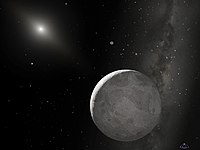Portal:Astronomi/Pilihan/Ogos

Definisi sebuah planet telah terbukti elusive despite the term being one of the best-known astronomical words. The term planet has existed for thousands of years, not only in science but as part of wider culture, applied in its long history to everything from divination to environmentalism. That the solar system consists of nine planets is a widely-held and often repeated idea. To date, however, no actual scientific definition of the word "planet" exists. Until the beginning of the 1990s, there was little need for a definition, as astronomers had only a single sample within the solar system to work from, and the sample was small enough for its many irregularities to be dealt with individually.
However, since 1992 and the discovery of a myriad of tiny worlds beyond the orbit of Neptune, the size of the sample has risen from nine to at least several dozen. Following the further discovery of the first extrasolar planet beyond our solar system in 1995, the number of samples is now approaching hundreds. These new discoveries have not only increased the number of potential planets, but, in their variety and peculiarity (some large enough to be stars, others smaller than our Moon) challenged long received notions of what a planet could be.
The issue of a correct definition for planet came to a head in 2005 with the discovery of the trans-Neptunian object 2003 UB313, a body larger than the smallest accepted planet, Pluto. The International Astronomical Union, or IAU, which is the body responsible for resolving issues of astronomical nomenclature, has stated that it intends to release its final decision on the matter in September 2006.
Recently featured: Sun – Planetary nebula – Comet Hale-Bopp
| ...Archive | Read more... |
